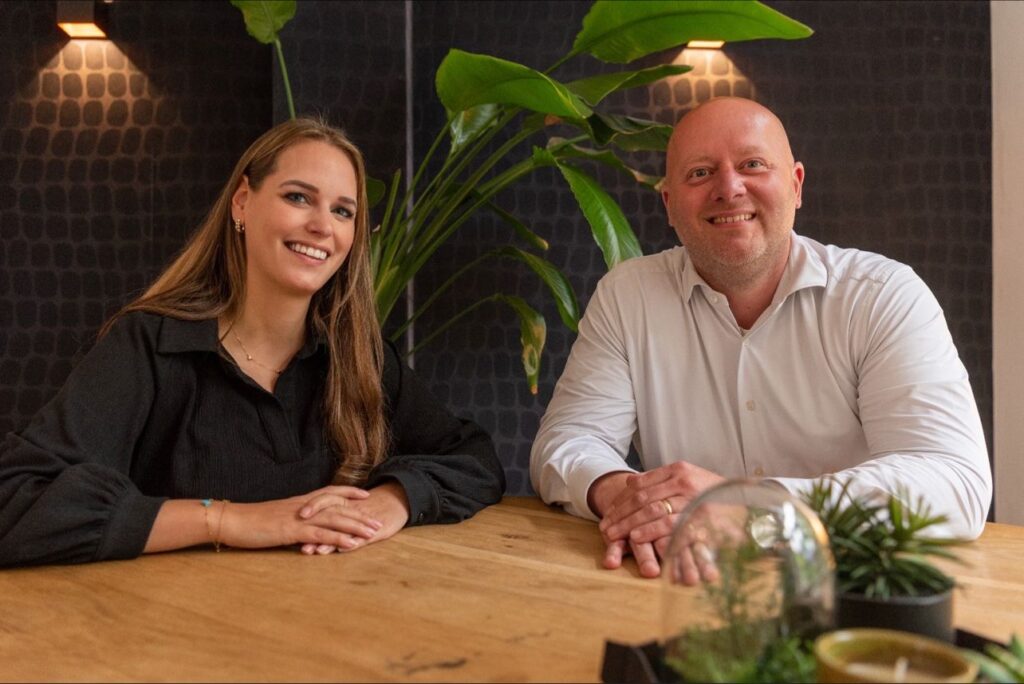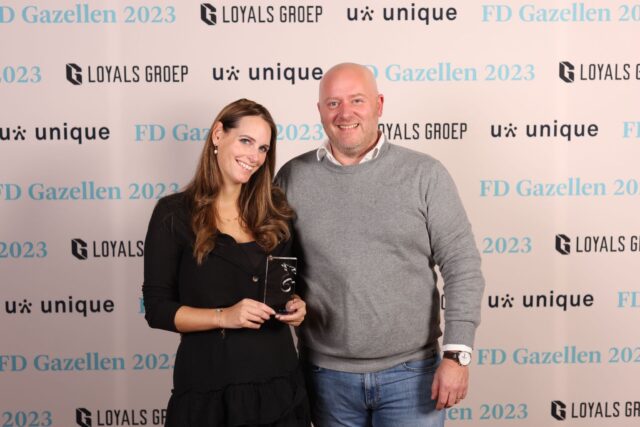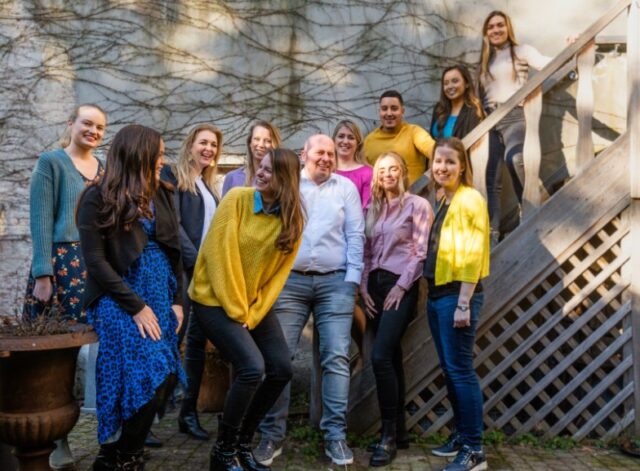
In recent years, Cooble from Den Bosch has grown into the sourcing specialist in the Netherlands, which is also gaining more and more relevance with talent pools. ‘Cooblen’ has even become a household name. Time to delve deeper into all the trends in the sourcing field with founder Jan Karel Sindorff and co-partner and ‘sourcing geek’ Milou Verhoeks.
> You won an FD Gazelle last year. Do you want to become the unicorn of sourcing?
Sindorff: ‘Not us.’
Verhoeks: ‘You do, I don’t.’
‘Growth is not the most important thing, rather that we are all doing something that we really enjoy.’
Sindorff : ‘An FD Gazelle is especially useful for attention and more marketing.’

Verhoeks : ‘Growth is not the most important thing, rather that we are all doing something that we really enjoy. I live more day by day, Jan Karel is better in the long term. He shouted that we had to become the largest in the field of sourcing. Well, we did it. And indeed, everyone should think of us and we employ 30 people. I always said, there really shouldn’t be more than 10. So that got a bit out of hand.’
Sindorff : ‘Sales growth comes naturally if your product is good, if you deliver quality.’
> When did you decide to specialize in sourcing?
Sindorff : Milou and I know each other from ASML as colleagues. Milou once gave a presentation about how we approached sourcing at ASML. Other companies in the recruitment field responded very positively. That planted the seed in both of us. Apparently our approach to sourcing was more unique than we realized. After we started our own business, we clearly chose to profile ourselves this way. Milou is the real sourcing expert and I am good at coming up with plans and putting down ideas.’
> What were the striking trends for you in 2023?
Sindorff : ‘The whole world is of course falling for AI. A hugely hot topic. This technical development will be set up in due course. But not so spectacular and life-changing for us .’
‘AI cannot yet approach that truly personal approach.’
Verhoeks : ‘We test everything and take everything with us. But if you focus on quality sourcing, you actually assume that the approach to each candidate is something very personal. And AI cannot yet approach that personal approach. Not yet, because maybe it will happen. In fact, AI is a kind of disruptor in our field. I write 10 to 15 minutes per message. Then you can send out 4 to 5 per hour. If you compare that to a robot, we are simply very expensive. But if that robot destroys your name, then its work is pointless. The market is quite tired of all recruiter messages, now you only get more, with that AI. The candidates are in a demand market. Because it becomes easier to create messages, it is tempting to send out some extra.’

Sindorff : ‘An AI tool should be able to interpret your profile and find a way in which we try to entice you to get in touch with us. That’s a skill that no tool has yet.”
‘An AI tool cannot yet find a way in which we try to entice you to contact us.’
Verhoeks: ‘Take a candidate journalist. And I see that he is treasurer for a pigeon club. Coincidentally, I know that my client is looking for someone like that, who is handy with texts and numbers. I can make that combination as a human, but not yet an AI. Many recruiters and recruitment departments have a kind of paid subscription to a tool and start sourcing that way. But then you, who normally receive about 5 messages a week (which already irritates you quite a bit) from people asking if you want to work at a call center, now suddenly receive 15 more messages, which are so generic that you kind of hate them. /love relationship with the world of recruitment. Then we don’t have to approach 100,000 people. We want to have 20 people, in this case in the border areas of journalism and finance. That’s our job.’
> If the rest of the sector starts working more generically, won’t they create extra space for you?
Sindorff : ‘Yes, but a consequence could also be that people stay away from platforms such as LinkedIn, where we can still find them. I see that the role of the sourcer is shifting towards properly maintaining your talent pools.’
> Like you do at the Public Prosecution Service?
Verhoeks : ‘If you are looking for someone with a certain profile, such as at the Public Prosecution Service , then lawyers are the target group. Yes, at some point you’ve had them all. Then you’re done. A new batch of lawyers is added every 2 months, but it is mainly about maintaining contacts with the people we already have, continuing to call and staying in touch. So then you have to be much more communicative. That doesn’t suit the old sourcer who stayed behind his computer and sent messages.’

Sindorff : ‘That concept rubs against recruitment agencies with their permanent talent pools. They also see us as competition. But we have a different commercial model and a different interest, namely to create something that also works and needs to be managed in the longer term. We don’t want to compete with those types of agencies.’
‘In the meantime, companies and recruiters have learned that actively connecting talent to organizations is here to stay.’
‘One of the bigger changes in the past 2.5 years is that sourcing is seen much more as a separate profession and as a full-fledged part of a recruitment department. More than 2 years ago, all the financial floodgates opened, with sometimes as many as 10 interim recruiters, to bring in talent again after corona. But in the meantime, companies and recruiters have learned that actively connecting talent is here to stay and is not necessarily related to the number of vacancies. If people understand that there are structurally too few people on the labor market and that they have to work on that relationship: we have claimed that domain within sourcing.’
> What do you notice about the slowing economic growth?
Sindorff : ‘No one knows exactly at the moment, because we have not experienced this yet. Two quarters of economic contraction logically means an expansion of the labor market. But it has not become more spacious, rather less cramped. That is unprecedented. What impact will this have on the recruitment industry as a whole? Organizations’ recruitment budgets are decreasing.’
‘I think that the structural scarcity is favorable for Cooble’s position in the long term.’
‘Companies that target IT and technology candidates, or finance, purchasing, with structurally too few people, who invest in their own employer brand. To ensure that vacancies are findable, a good website and a good group of recruiters want to build their position in the labor market. There may be fewer vacancies today than yesterday, but they continue to invest in talent relationships. I think that is beneficial for Cooble’s position in the long term.’
> Your response rate has increased in 2023. How did that happen?
Verhoeks : ‘We really make it a sport, for us it is a challenge that people respond. We can do a lot of A/B testing and see what works and what doesn’t. And furthermore: stay creative with each other, share ideas. If I see a profile and I want to make it personal even though there is little on it, I look up someone’s name in a first name bank and I know how many people in the Netherlands have that name. Then it is immediately personal, even though I don’t know much about him or her.’
‘When you write a message you should have the feeling that it would be strange if the person didn’t respond.’
‘We extract several things from a profile and link them. When you write a message you have to feel like it would be strange if the person doesn’t respond. On average in the Netherlands, our response rate is lower. So it works, our ’tricks’.”
> You have a successful team with low turnover. How do you retain your own people?
Sindorff : ‘When you come to work for us, one of the first things you have to do is open your LinkedIn profile. Not ‘ open to work ‘, but so that you receive messages and know what is going on in the market. Some customers ask: did you realize that almost everyone in your company wants a different job? But that is precisely the intention, because then we also see what messages the competition is sending. Our strength as an employer is that we are a very open company.’
‘When sourcers come to work here, they feel strengthened among supporters.’
Verhoeks : ‘We have a talent pool ready. I really have a hot list of people who would like to work with us. We have a luxurious position, many people who want to start sourcing want to work at Cooble. Since 2022, we have profiled ourselves on the market as sourcing specialists. Here you are among fellow sourcers who understand you. Sourcers can get quite annoyed with recruiters.’
> Why?
Sindorff : ‘As a sourcer you have to work much harder for your candidate. Sometimes a company has about ten recruiters, who, if it is not possible to attract a candidate, pass the job on to the sourcer. He or she goes screaming crazy, because as a (often) younger and cheaper worker, he or she often does not dare to say no to his recruiter colleagues when it comes to difficult cases. Sometimes the vacancy has already been filled and no one has informed the sourcer, a lot often goes wrong in communication. When those sourcers come here to Cooble, they feel strengthened among supporters.’
> What are your plans for 2024?
Sindorff : ‘2024 will be the year in which we will do more around talent pools, and we will not only be the driving force to attract talent to organizations, but we will increasingly focus on long-term solutions. Sourcing is the engine, but we are expanding around it. We do not have a fixed package of services, our core is and remains bringing talent and organizations together. However, we are increasingly receiving customers for whom we include the entire administrative chain. It’s great that we introduce 10 new people every week, but their operational equipment can’t handle that. How can we organize that, they ask us.’
‘Sourcing is still the driving force, but we are expanding around it.’
Verhoeks : ‘We have always worked data-driven and have very nice data internally. We have renamed 2 of our people data experts, who have delved into ‘power BI’ . There are still some teething problems, but these benchmarks are becoming more and more interesting. Until now we had all the data in one pile. Now we can zoom in per target group, per invoice, whatever you want. This way we can help our customers better, show them the impact of actions and what is happening on the market. We are not a data analysis club like Intelligence Group. But we had 17,000 contacts on the labor market in 2023. That also produces a lot of data.’
Read more?
This story can also be found – abbreviated – in the 180-page Werf& Jaarboek, which was published last month. Would you like to receive a free (digital) copy? Request it here!



